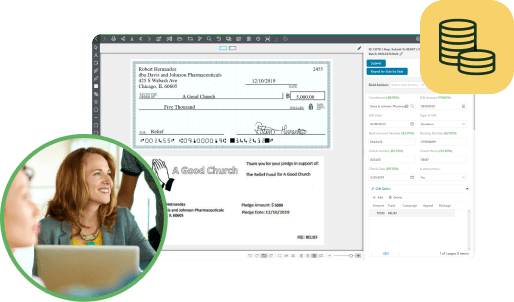Your CRM is your core fundraising tool, providing features for hosting campaigns, communicating with supporters, and above all, storing donor data. The information you collect about donors is essential for shaping fundraising campaigns that grab their attention and earn long-term support.
But what data should nonprofits collect? A few obvious ones include contact information, engagement history, and demographic information. Another valuable but often overlooked data point to keep in mind is employer information. However, many nonprofits don’t think to ask about a donor’s place of employment when connecting with them.
To gather this data in an efficient manner, consider an employer append. If you’re unfamiliar with employer appends, this is the guide for you. We’ll answer core questions nonprofits new to appends are likely to have and explain why employer appends are valuable.
What are employer appends?
NXUnite by Nexus Marketing provides a succinct definition of data appends: “A data append is a piece of new information added to your nonprofit’s database.” To qualify this definition, appends are provided by a third party using data sets unrelated to your nonprofit. In other words, a member of your team updating a donor profile after learning something new about a supporter would not be an append, whereas a formal append service providing updated phone numbers for hundreds of donors would.
Employer appends, specifically, are supplemental datasets your nonprofit can purchase that fill in information about your supporters’ employment. This includes data such as their employer’s names, position names, length of employment, and so on.
With this information, nonprofits can make assumptions about supporters’ income levels to refine donation requests and identify potential major giving prospects. Additionally, nonprofits can send matching gift requests to donors they know work for companies with corporate philanthropy or CSR programs.
What are the benefits of employer appends?
Every type of data append comes with its own benefits, from phone number and email address appends providing new points of contact, while demographic appends improve audience research.
As mentioned above, employer appends allow nonprofits to:
- Identify matching gift opportunities. Employer matching gifts are donations companies make when their employees donate. When a match-eligible employee gives to your nonprofit, they just need to fill out a form with their employer to have their company also send your nonprofit a donation. However, most supporters are unaware of matching gifts. With an employer append, you can identify which of your donors likely qualify for matching gifts and reach out to inform them about this opportunity to give more without spending more.
- Estimate income levels. An employer append won’t share income information but it will provide your donors’ job titles. With these, you can make estimates about supporters’ giving capacity. For example, if someone is an executive or senior-level employee, that might be a sign to ask for a little more during your next round of donation requests.
- Discover sponsorship opportunities. Along with providing more information on your supporters, employer appends give insight into potential corporate partners. If you notice many of your supporters work for the same employer, consider reaching out to them to organize a corporate volunteer day, set up a giving program, or organize a sponsorship.
Ultimately, employer appends are a tool, and it’s up to your nonprofit to leverage the data you receive to connect with supporters, identify new revenue opportunities, and build relationships with businesses. Before purchasing your append, ensure you have a plan in place for how you will use the data. Appends cost money, so determine whether your budget can handle purchasing one and how you intend to make up the return on your investment.
How can nonprofits use employer appends?
Once your nonprofit receives an employer append, you can use this data to send automated, targeted messages to supporters about corporate giving. With the ability to pinpoint which of your supporters potentially qualify for matching gifts, your nonprofit can start tapping into this new revenue source.
To get started with an append, NPOInfo’s guide to employer appends walks through the steps nonprofits will take as part of the appending service:
- Gather donor data. Collect data from your donors as you normally would by asking questions on donation, volunteering, and other registration forms. Consider what information you ask for and what format supporters are required to enter it in.
- Maintain a high standard of donor data hygiene. Ensure your data is easy to use by keeping it organized and up-to-date. Ahead of your data append, go over your database to ensure information is standardized, duplicate data is removed, and useless records are eliminated. This ensures the data you receive from your append service is as accurate and easy to use as possible.
- Input your data. Provide your data append service with information about your donors, such as their names, mailing addresses, email addresses, or any other information you have about them. This identifying information enables data append service providers to find data about your donors and match it to the right donor profile. For instance, a data provider might use a donor’s phone number to find their professional email, which allows them to find their employer.
- Receive output data. After sharing data with your append service, you’ll receive information about your supporters’ employment, such as their employers’ names, job titles, and corporate matching gift program information. Your append service may also provide an accuracy rating, which is a measure of how confident your service provider is that they identified the donor and provided correct information.
You may hesitate to share donor information with a third-party service, but nonprofit data append services are familiar with the cybersecurity protocols charitable organizations follow. These organizations will safeguard your information while they have it and delete files shared with them after delivering your append to keep your supporters’ data safe.
When it comes to connecting with supporters, identifying marketing opportunities, and earning donations, data is everything. To make the most of matching gifts and other corporate giving programs, start researching employer append providers. Use a trusted organization familiar with nonprofits to deliver accurate data securely.






